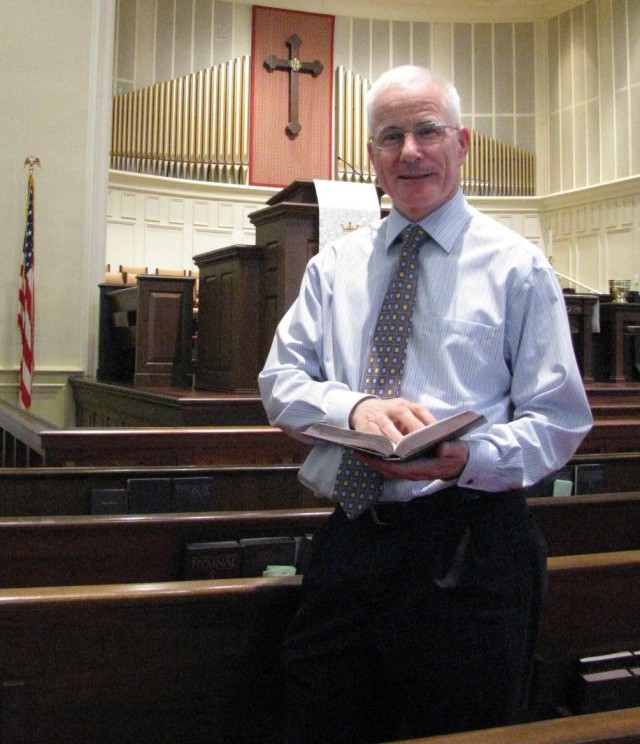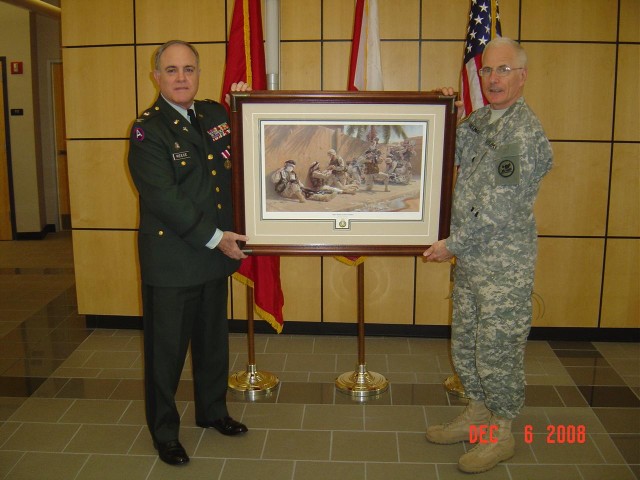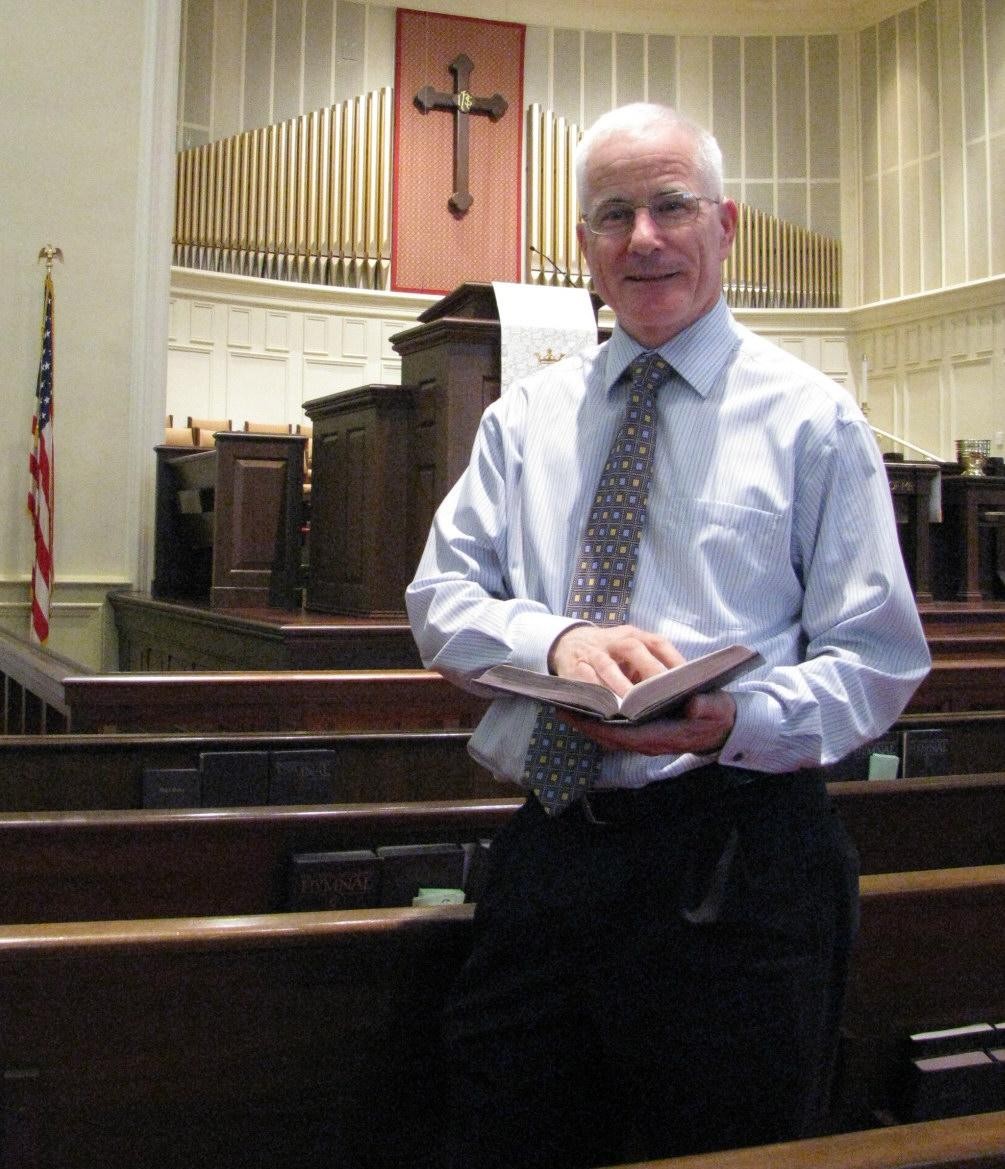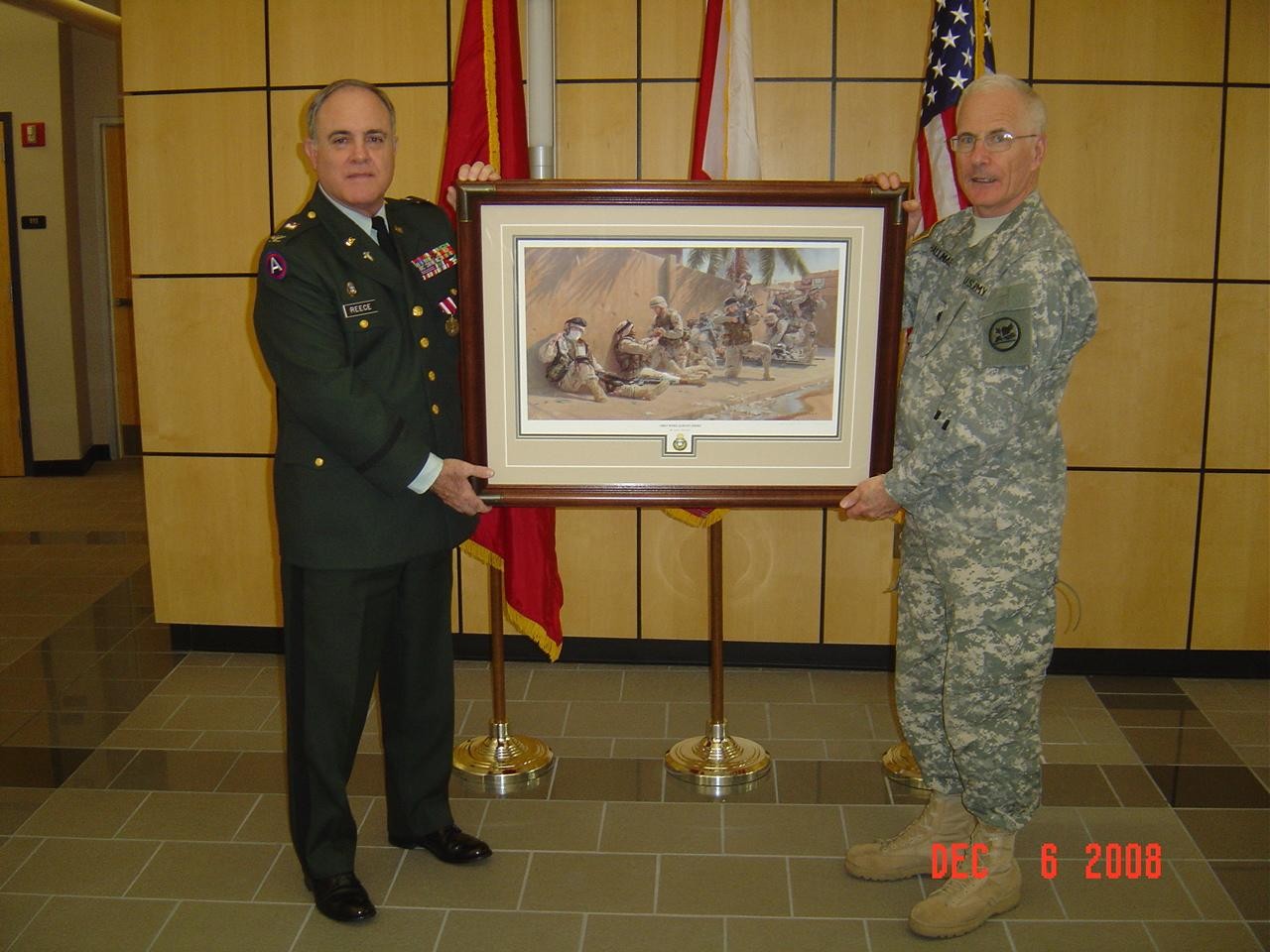The Rev. Coy Hallmark carries a small black Gideon Bible in his jacket pocket that once belonged to World War II veteran Capt. Hartsell Northington.
The Bible was given to Hallmark as a gift of gratitude by Lola Northington following her husband's death.
"His widow gave it to me on Veterans Day 2007. I was so touched by it because I had done his funeral," Hallmark said. "I told her I would put it somewhere safe. She said 'No, don't put it up and take care of it. Read it. Use it.'"
True to her instructions, Hallmark often takes the Bible out of his pocket to read or to share with others. The Bible, which includes a message from President Franklin Roosevelt and the words to "The Star-Spangled Banner" along with the New Testament and Psalms and Proverbs, travels with Hallmark to every Alabama National Guard drill weekend, where he uses it to talk to Soldiers about their faith.
The Bible is bound to get a lot of use from Hallmark, especially now that he has been named the state chaplain for the Joint Forces Headquarters, Alabama Army and Air National Guard. In December 2008, Hallmark, who was promoted to colonel, assumed the chaplain's post from Col. James Reece, who has retired.
"I was happy as a lieutenant colonel. I was going to retire. I was at peace and thanked God for my service," said Hallmark, a pastor at First United Methodist Church in Huntsville.
But the Department of Defense had other ideas. Hallmark and two other Alabama National Guard chaplains were selected for promotion to colonel on the same day, which meant they were chosen to field a colonel slot in the National Guard. One of those chaplains needed a full-time position, so he went to the Reserves. Another, who is an Iraqi War veteran, took a colonel position as a chaplain with the Guard's Theater Support Command in Birmingham.
When the state chaplain position became available with the impending retirement of Reece, the 56-year-old Hallmark was the one tapped for the job.
"It was a whole lot about timing and being in the right place at the right time," he said.
This isn't the first time Hallmark has received a military calling to serve. He was a 30-year-old minister to congregations in Morgan and Cherokee counties in July 1983 when he received a calling to become a National Guard chaplain. In a way, the calling was in response to a need he felt to help and support veterans of Vietnam.
"My lottery number during the Vietnam War was number 210 and they drafted up to 185. So, I wasn't drafted for Vietnam," Hallmark said. "But I lost a couple of close friends in Vietnam and my brother-in-law was both physically and mentally wounded by the war. He was with the 173rd Airborne Brigade and he lost 16 of his friends on the fist day in Vietnam.
"I felt like I should do something to make my contribution to these veterans. I needed to listen to their stories and minister to them if I could. A couple of district superintendants (in the Methodist church) presented the invitation to me. They told me I could be a National Guard chaplain and still serve my church."
Hallmark, who graduated from Emory University in 1979 with a master's of divinity, attended chaplains' basic training at Fort Dix, N.J., and chaplains' school at Fort Monmouth, N.J. During his chaplain career, he has served with the 279th Signal Battalion, 142nd Signal Brigade and the 1169th Engineer Group.
"As a chaplain in the Guard you have the same responsibilities as in a church to provide religious support," Hallmark said. "It's every Soldier's First Amendment right to freely be able to practice their faith. Chaplains guarantee Soldiers their free exercise of their faith. We bring Soldiers to God and God to Soldiers. It is a ministry of being present with Soldiers and families, and especially for being there in a time of crisis. The Soldier sees the chaplain as representing their connection to something greater than all."
His duties have included providing and conducting religious services, counseling and praying with Soldiers, and calling in religious leaders of different faiths when requested by Soldiers. But Hallmark said his service as a Guard chaplain often went beyond the routine duties of a minister.
"In many ways it was what I expected. But in many ways it was far more meaningful as it relates to ministry with people as they experienced life and went through marriage, death, divorce and serious illness," he said. "It became far more of a connecting thing than I expected. I got really, really close to a lot of Soldiers from the Vietnam era and even the Korean War era."
Hallmark often likes to share the messages of the 23rd Psalms and Psalms 121, verse 3 with Soldiers and veterans. "The scriptures tell us that God is going to take care of today, so don't worry about today," he said. "That goes for Soldiers, too."
Military chaplains often mean different things to different Soldiers, depending on their personal backgrounds and their understanding of their faith.
"But all Soldiers know that the chaplain is there to listen to them, to pray with them and to make contact with home for them if they need that," Hallmark said.
"When there's trouble and the first sergeant and the commander can't fix it, the JAG officer can't fix it and the medical corps can't fix it, then it's common to hear 'You'll just have to go see the chaplain. The chaplain will listen to you and pray with you.'"
In Hallmark's office at First United Methodist Church there is a print of a painting titled "They Were Always There" by retired Chaplain (Col.) Larry Selman. The print depicts wounded Soldiers of the 3rd Infantry Division and the 101st Airborne (Air Assault) Division being ministered to by a chaplain during the southern approach into Baghdad, Operation Iraqi Freedom, in March 2003. A female chaplain assistant provides armed protection while the chaplain speaks to the wounded Soldiers. The print was given to Hallmark by his brother, Phillip, whose own son, West Point graduate Capt. Tyler Hallmark, is now serving in Baghdad.
"This print is very special to me and to all chaplains who are serving their country and the Soldiers who go into battle," Hallmark said.
There are 38 chaplains (30 Army and eight Air) assigned to the Alabama Army and Air National Guard. But, currently, only 24 of those slots are filled, with 14 slots open in the Army Guard.
"We are getting the majority of our chaplains from the current military," Hallmark said. "In those cases, they are Soldiers who understand the military and have a religious calling. But any minister with an ecclesiastical endorsement and a master's of divinity can be a chaplain in the National Guard."
In his role as the state's Joint Forces National Guard chaplain, Hallmark will meet quarterly with chaplains from the Guard's major commands - the Troop Command, Theater Sustainment Command, Chemical Brigade and Air National Guard -- and then meet with the entire chaplain corps at their annual chaplains' workshop in August.
"My responsibility is to provide direct religious support to the Joint Forces Headquarters and to serve in a supervisory role with the major commands in the state and the 30 Army chaplains," Hallmark said.
"I'm responsible for recruiting, training and supervising the state's Army chaplains. My priority is to prepare chaplains for deployment and provide support to their families and welcome them back home."
Hallmark said deployments of Alabama Army National Guard units are expected during the next two years.
"The deployment cycle continues to be very active over the next few years and our chaplains will continue to deploy with troops," he said.
Whether in a deployment situation or just going through routine weekend drills, military chaplains need to be flexible and adaptable.
"Needs can change significantly and rapidly from conducting a worship to just listening to Soldiers en route to the next crisis or to sharing scripture and prayer one-on-one," Hallmark said. "Sometimes chaplains are much more effective in those one-on-one situations than they are in worship.
"In a local civilian parish, church is somewhere you go to worship. In a military setting, church is on the go no matter where you are."
Hallmark is looking forward to the challenges of serving as the state chaplain. He feels blessed to have three more years to serve the state's Soldiers.
"I love being a National Guard chaplain. It's one of the best things I've ever done," he said. "It is a burning and boiling of my blood. I love Soldiers and veterans. If you give them your love, they will love you in return."
Editor's note: For more information about joining the Alabama Army and Air National Guard's chaplains corps, call 1st Lt. Scott Massey at (205) 337-4108.




Social Sharing